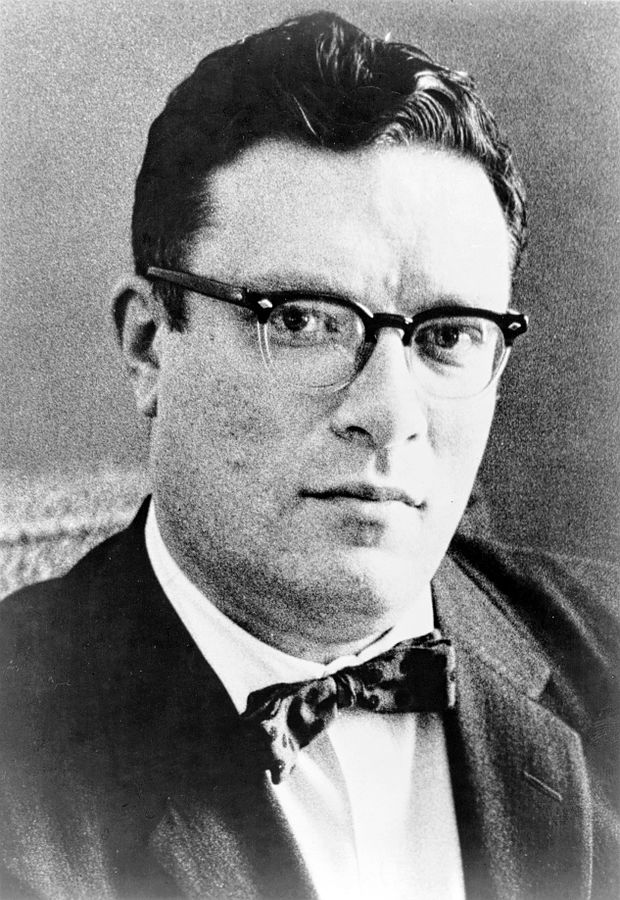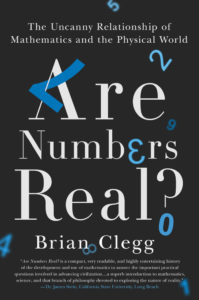by Brian Clegg
If there’s one lesson that we have learned from recent shock political results, whether it’s Brexit in the UK, or the election of Donald Trump to the White House, it is that we can’t trust the polls, which failed miserably to predict the outcomes. This is the kind of issue that is at the heart of my recent book Are Numbers Real?, exploring the relationship between mathematics and reality. Science has come increasingly to depend on math, to the extent that much modern physics is driven by it – yet mathematics and reality are very different things, especially when dealing with as complex a system as a country’s electorate.

To make their numbers work, physicists often apply extremely broad simplifications. This leads to the old scientist’s joke: a dietician, a geneticist and a physicist are arguing about how to produce the perfect racehorse. The dietician says “We just need to develop a perfect diet for physical stamina.” This makes the geneticist shake her head. “No,” she says, “the important thing is to breed selectively for the essential characteristics of speed.” The physicist frowns and turns to a whiteboard. “Let’s assume the racehorse is a sphere.”
The Decline and Fall of the Roman Empire, Asimov’s Inspiration
The failure of the pollsters would have saddened that doyen of American science fiction writers, the late, great Isaac Asimov. Asimov based his Foundation series of stories on a fictional concept called psychohistory. This involved an extremely powerful form of statistics, which was able to predict the development of the culture it studies, down to individual events. In Asimov’s Foundation series, a team of mathematicians led by Hari Seldon lays out a broad brush prediction of the way that the galactic Empire would fall apart, leaving recorded messages that predict future events through the centuries. In the books, this process fails when a mutant somehow falls outside the system’s predictive ability. But in reality there was never any need for such a far-fetched reason for the system fail. Psychohistory could never work in practice.

Asimov was inspired in his vision of a collapsing empire by the eighteenth century book The History of the Decline and Fall of the Roman Empire by Edward Gibbon. This seemed to show that specific drivers would inevitably result in an empire falling apart. In particular, Asimov picked up on the way that the Roman empire increasingly suffered as a result of the low speed of communication, making a widespread physical empire incapable of responding quickly enough to central control. Without good communication an empire was on borrowed time.
Was Communication the Reason the Roman Empire Fell?
In Roman times, the fastest mechanism for transmitting a complex message across land had been the horseback messenger, whether carrying a verbal communication in his head or a written document in his saddlebag. Where water intervened, the transmission rate for information came down to the speed of a boat. A message from just a few hundred miles away could take days – over continental distances, the lag would be weeks or even months.
Asimov saw that the same problems would apply in a galactic Empire where, however good the technology, the time delays on communication between the imperial capital and outposts would inevitably lead to the same kind of issues that Rome had faced. Local challenges on distant planets could not be fed back to the center quickly enough to respond. The result, inevitably, was an outbreak of rebellions, splintering of the empire and decline. But the difference in Asimov’s imagined version was the existence of psychohistory, which its proponents hoped would enable the transition through the inevitable period of savagery (inevitable to Asimov’s eyes, based on Gibbon’s pattern) to be made far quicker than without the math-based intervention. This saving mechanism was, strangely, inspired by our understanding of gasses.
The Complexity of Random Events
Physicists know that, while we can’t predict what individual molecules will do, we can take a statistical view across many of them to see how a gas will behave. Even though there are psychological parallels with this statistical mechanics in “group think” or mob behavior, in practice, we can’t apply the same kind of predictive statistics we use in forecasting the behavior of a collection of gas molecules to groups of people. Even so, Asimov extended the concept even further to a whole fictional mathematics of behavior.
In reality, anyone trying to use statistics to predict the future of anything as complex as a civilization comes up against the same problem faced by those trying to make long term forecasts of the weather. The system is far too complex to make meaningful predictions. It is highly chaotic in the mathematical sense. This means that small changes in starting conditions – typically, in the case of a population of humans, caused by the actions of individuals – have huge impact in their outcomes.
This mathematical concept of chaos is very different from the association the word has in everyday use. Usually, when say something is chaotic, it is random and out of control. Mathematically, though, chaotic systems are perfectly systematic and ordered. It’s just that the way the system works results in such unexpected swings and changes that it is impossible to make consistent, sensible predictions beyond a very close time horizon.
Applying Asimov’s Principles Today
Chaos occurs because different parts of a system don’t function independently, but influence each other. If you have a number of different factors, influencing a range of objects, all of which interact, prediction is a nightmare. Even simple systems can be chaotic. As Newton discovered, put just three astronomical bodies in space and all you can hope to do is approximate to a prediction of their behavior. Now think of trying to predict the actions of millions of people, many of them interacting and producing complex feedback loops, and it’s amazing that polls ever worked in the first place.
The reason that pollsters often got away with apparently making useful predictions in the past, is that they relied on the same level of simplification as the physicist trying to improve the racehorse. Groups of voters were amalgamated on crude social and political lines to make it possible to identify a representative sample and magnify that result to predict the decision of a nation. However, a combination of new communications channels, breaking through the old, physical social networks, and the increasing divide between a mass of the electorate that rarely voted and what were perceived as metropolitan elites with no understanding of ordinary voters’ lives, meant that simplifications used by the pollsters no longer operated.
Will the American Empire Follow the Romans?
Do the recent political upheavals mean that what many regard as the American Empire will collapse as Asimov portrayed in his books? Not necessarily. We have, if anything, the opposite problem to that faced by Rome and Asimov’s galactic empire. In our world, communications happen far faster than ever before. So fast that our traditional mechanisms of monitoring and assessing behavior have simply been left behind. Mathematics will always be essential in predicting future outcomes. But the recent results have shown that without a better understanding of people, and the variables in play in today’s world, our mathematical models can prove useless.
Brian Clegg is the author of 30 books. Most recently ARE NUMBERS REAL?: The Uncanny Relationship of Mathematics and the Physical World and Ten Billion Tomorrows among many others. He holds a physics degree from Cambridge and has written regular columns, features, and reviews for numerous magazines. He lives in Wiltshire, England, with his wife and two children.

